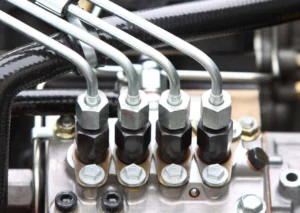Fuel Injection System: The Precision Engineer Behind Your Engine’s Performance
 The fuel injection system is the automotive marvel responsible for delivering the perfect blend of fuel and air to your engine. It’s a complex network of components that ensures your vehicle operates efficiently, with optimal power and reduced emissions. In this blog post, we’ll delve into the world of fuel injection systems, exploring their significance, how they work, common issues, and why professional auto service is essential to maintain peak performance.
The fuel injection system is the automotive marvel responsible for delivering the perfect blend of fuel and air to your engine. It’s a complex network of components that ensures your vehicle operates efficiently, with optimal power and reduced emissions. In this blog post, we’ll delve into the world of fuel injection systems, exploring their significance, how they work, common issues, and why professional auto service is essential to maintain peak performance.
The Crucial Role of the Fuel Injection System
The fuel injection system is the beating heart of your engine, performing vital functions:
- Fuel Delivery
It precisely meters and delivers fuel to the engine based on driving conditions and demand. - Air-Fuel Ratio Control
Maintains the ideal air-fuel mixture for combustion. - Optimized Combustion
Promotes efficient and complete combustion, maximizing power and reducing emissions. - Cold Start Assistance
Ensures smooth engine operation, even in cold conditions. - Improved Fuel Efficiency
Fine-tunes fuel delivery for better mileage.
How the Fuel Injection System Works
The fuel injection system operates through a series of steps:
- Air Intake
Air is drawn into the engine through the air filter. - Sensors
Various sensors measure factors like airflow, engine temperature, and throttle position. - ECU Control
The engine control unit (ECU) processes sensor data and determines the optimal fuel injection timing and duration. - Fuel Injection
Fuel injectors spray precisely measured fuel into the intake manifold. - Combustion
The air-fuel mixture is ignited by the spark plugs, creating power.
Common Fuel Injection System Issues
Over time, fuel injection systems can encounter problems, including:
- Clogged Injectors
Reduced fuel flow can lead to poor engine performance. - Dirty Sensors
Contaminated sensors can provide inaccurate data to the ECU. - Leaking Fuel Lines
Fuel leaks can pose safety hazards and reduce fuel efficiency. - Faulty ECU
A malfunctioning ECU can result in incorrect fuel delivery. - Airflow Problems
Obstructions in the air intake can disrupt the air-fuel ratio. - Injector Wiring Issues
Damaged wiring can affect injector operation.
Why Professional Auto Service Matters
Professional auto service is crucial for maintaining and repairing fuel injection systems:
- Expertise
Skilled technicians possess the knowledge to diagnose and address system issues accurately. - Advanced Tools
Auto shops use specialized diagnostic tools to analyze system performance. - Quality Parts
Reputable providers use high-quality replacement components for lasting performance. - Emissions Compliance
Professional service ensures your vehicle complies with emissions regulations. - Optimized Performance
Proper maintenance can enhance engine power and fuel efficiency.
The fuel injection system may work silently behind the scenes, but its role in your vehicle’s performance and efficiency is paramount. Understanding its significance, recognizing signs of issues, and adhering to maintenance schedules are essential. However, entrusting fuel injection system maintenance and repairs to professional auto service providers is the key to ensuring your engine operates at its best. So, the next time you hit the road, remember the precision engineer beneath your hood—the fuel injection system that transforms fuel and air into the power and efficiency that drives your journey.











